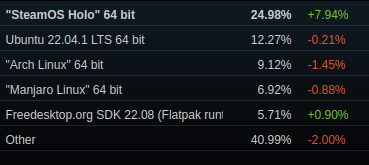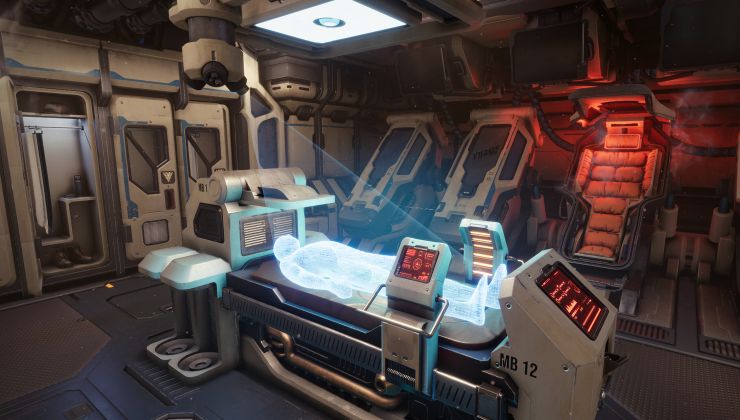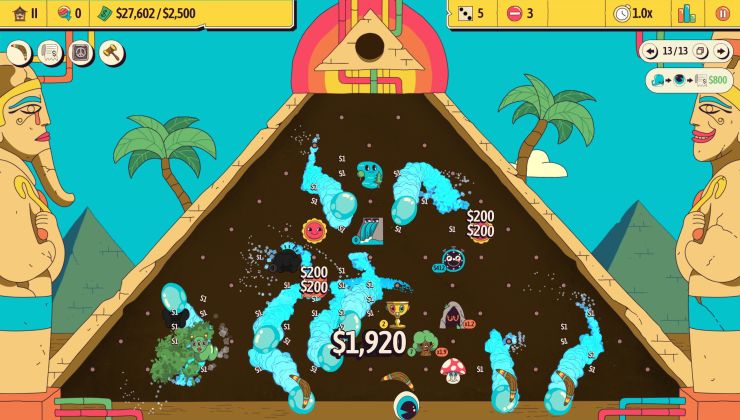Back in 2020 I pointed out what were the best Linux distributions for gaming, so here's the current state and what you should go for in 2023.
The thing is: not a lot has changed since my last article. Linux is still a minefield of many different distributions for people, and it can be very confusing. There's a lot of articles out there recommending really random and outdated distributions in lists too, so here's the real thing.
Without getting bogged down into packaging issues, and just giving you the basics of "this will work just fine" — go and install Ubuntu. People will (and I expect them to) argue for others, and people are free to, but a lot of people suggest other distributions for the wrong reasons. Manjaro has too many problems both technical and management, Arch can and will break things if you don't know exactly what you're doing, Fedora is messy with NVIDIA drivers and SELinux on Fedora is a nuisance and so on. Ubuntu is still to this day, the most simple distribution of Linux to install and get gaming.
Ubuntu isn't perfect by a long shot, but it remains as my number 1 choice to suggest to people both new and old to get into Linux and get gaming. It's one of the most used on desktop by any statistic you can find, which also means troubleshooting it is generally easier too.
With the Ubuntu LTS (long term support) releases, you also get support for at least 5 years, so you don't have the hassle and potential breakage of major system internal updates for quite a long time.
Valve's own stats show Ubuntu as one of the most popular too and it has been the same since Steam came to Linux.
As a user of Fedora myself, take it from me if you're in any way new to Linux: just go with Ubuntu. If you ever decide you "really know Linux now", then you can think about using something else. Don't make it difficult for yourself.
How might this change in future?
Well, Valve are here with the Steam Deck and SteamOS. Eventually, Valve will release SteamOS 3 so anyone can download it and install it. That might end up being a good pick, but right now it's not on the table as it's not released and anyone making their own version of it (like HoloISO and others) are too small to recommend serious use of them.
If you need help and support, specifically for Linux and also Steam Deck gaming, you can try asking in our Forum, Discord, IRC and Telegram.
I would recommend a flavor like Kubuntu over Ubuntu, especially for a new user. Plasma is going to look more "sane" than GNOME, which is something I can attest to from back when I first tried Linux.
I think it depends on where you are coming from. I guess KDE/Plasma feels more familiar for Windows users, whereas Gnome is much closer to macOS.
I would recommend a flavor like Kubuntu over Ubuntu, especially for a new user. Plasma is going to look more "sane" than GNOME, which is something I can attest to from back when I first tried Linux.
I wholeheartedly agree. I denied the Plasma bandwagon for a bit (the first time I tried KDE desktop, several years ago, I didn't like it too much), but switched a few months ago on my desktop. On my laptop, I use Fedora with Cinnamon desktop. I like them both so much better than the stock Ubuntu desktop. Nowadays, everytime I use that on my gf's laptop, I'm appalled. I might like it less than the Windows DE.
GNOME does appear to have improved a lot, but Plasma and Cinnamon are going to be much more recognizable coming from Windows.
I researched this at the time but could not find a clear-cut answer. See, for example, this page on the End Software Patents wiki: https://wiki.endsoftwarepatents.org/wiki/Software_patents_exist_in_Europe,_kindaAs for why ffmpeg's x264/x265 can be freely used by free software media players that distribute their software to users like VLC, it has been suggested that France cares less about software patents than other countries (I don't know how true this is).It's true. France couldn't care less, since there are no software patents in the European Union. This is not country-specific or a softer attitude, but an explicit rejection of the entire concept of software patents. Nobody pays software patent fees here.
And this page: https://wiki.endsoftwarepatents.org/wiki/Do_software_patents_exist_in_my_area
For example, the European Patent Office grants software patents. Courts in Germany have mostly rejected them, but courts in the UK have upheld some. This uncertainty reduces the problem: although there are 70,000 EPO granted software patents, the patent holders rarely go to court because they're afraid their patent will be invalidated.
This doesn't prevent the harm. Software patent holders in the EU can still threaten software developers, and they can demand sums of money. If the victim doesn't have enough money to defend themselves in court, then the patent holder might "win" and thus get money or market control even though their patent is probably invalid.
For France specifically, it's listed as part of a patent pool for H.264/AVC: https://web.archive.org/web/20110114054025/http://www.mpegla.com/main/programs/AVC/Pages/PatentList.aspx
After some years, for me, it's been a point where Pop surpassed Ubuntu in many ways. Specially in the gaming part. Top-notch installation, fast and polished, non bloated.
I'm not usually a fan of a company, but System76 really makes me feel different about it. Now I find myself recommending Pop!_OS for Linux newcomers.
To conclude, I'm now jumping between Pop and Arch constantly, but Pop makes it look so easy most of the time.
Note that this is just a humble opinion from a guy who tries to be as humble as he can. :)
Last edited by Minux on 3 December 2022 at 12:42 pm UTC
Ubuntu and derivatives are currently the best and I look forward to being able to install them on the Steam Deck at some point. I enjoy Kubuntu and Mint for most of my machines.
This isnt to say that all of the other loved distros arent great but many of the papercuts associated with using them means they are great for the people that they fit for. For a general audience the Ubuntu line just checks the most boxes.
I researched this at the time but could not find a clear-cut answer. See, for example, this page on the End Software Patents wiki: https://wiki.endsoftwarepatents.org/wiki/Software_patents_exist_in_Europe,_kindaIndeed, it's not black and white in theory, but in practice I have never seen any company be concerned about software patents. The EU is incompetent as always, but software patent lawsuits are usually dismissed with one or two exceptions, if they occur at all, which is why I simplified my previous comment. In the 2000s, for example, Europe was flooded with unlicensed MP3 players imported from China. MPEG LA didn't even try to ban them and every business was able to sell them legally.
And this page: https://wiki.endsoftwarepatents.org/wiki/Do_software_patents_exist_in_my_area
For example, the European Patent Office grants software patents. Courts in Germany have mostly rejected them, but courts in the UK have upheld some. This uncertainty reduces the problem: although there are 70,000 EPO granted software patents, the patent holders rarely go to court because they're afraid their patent will be invalidated.
This doesn't prevent the harm. Software patent holders in the EU can still threaten software developers, and they can demand sums of money. If the victim doesn't have enough money to defend themselves in court, then the patent holder might "win" and thus get money or market control even though their patent is probably invalid.
For France specifically, it's listed as part of a patent pool for H.264/AVC: https://web.archive.org/web/20110114054025/http://www.mpegla.com/main/programs/AVC/Pages/PatentList.aspx
However, the situation regarding design protection and other patents is just as terrible as in the US, for example Apple has used these "protections" to ban devices in Europe after failing to do anything with software patents.
Ubuntu 22.04.1 LTS 64 bit
0.16%
"Arch Linux" 64 bit
0.14%
"Manjaro Linux" 64 bit
0.10%
Linux Mint 21 64 bit
0.06%
Last edited by Deleted_User on 5 December 2022 at 8:48 am UTC
Ubuntu is one of the best OSs' that I have used, but Ubuntu also has a long way to go if I was already running into issues of being able to install important security updates after a couple months. I did not have anything exotic installed, just Steam and some other programs like VLC and chrome.
I am thinking of going back to Ubuntu after using popOS for a bit. Hopefully the issue I ran into with get resolved around February when Ubuntu 22.04.2 comes out.
Last edited by WayneJetSki on 5 December 2022 at 4:28 pm UTC
If you're not concerned by this scenarii, I think a debian based distribution makes more sense as they're lighter on resourcesTechnically, Pop!OS is a debian based distribution.
YAY
yes have to agree, although I would go Kubuntu rather than ubuntu, and would probably suggest Pop!_OS if nVidia is involved and you were ok with the de.The only Nvidia advantage for Pop is if your GPU/monitor combination means that the open source nouveau can't set the resolution properly (the black screen with the blinking cursor - for which there's a fix, but it is something that one would have to specifically learn about), which isn't all combinations and will hopefully become fewer as nouveau improves and the open source module from Nvidia matures.
Every modern distro can install the proprietary Nvidia driver as part of the installation process (just like Pop does), they just don't use the proprietary Nvidia driver in the installer environment (which Pop does).
Once the distro is installed, it's all the same.
Last edited by CatKiller on 6 December 2022 at 12:52 pm UTC
Valve agrees.
The obvious answer is Arch. Not even joking. If you are pleb like me, go with Manjaro. But everything apart from Arch for gaming is not "best".
Valve agrees.
Valve agreed that it was the best for them to base their own distro on, not the best to use at home as regular users.
Valve agrees.Valve feel that using Arch as a starting point for their own distro is better than waiting for Debian's package approval process to conclude. You aren't making your own distro, and you aren't waiting for Debian to pick up your upstream changes. Joking or not, your "answer" is nonsense.
By your logic, everything apart from Gentoo for non-technical use is not "best". Google agrees.
The obvious answer is Arch. Not even joking. If you are pleb like me, go with Manjaro. But everything apart from Arch for gaming is not "best".Joining the chorus here, Valve agrees that you should take a snapshot of Arch, test it for a few months, and then use it while refusing Arch's updates so you don't break your system. Not sure that constitutes a vote of confidence in how ordinary people use Arch.
Valve agrees.
The obvious answer is Arch. Not even joking. If you are pleb like me, go with Manjaro. But everything apart from Arch for gaming is not "best".
Valve agrees.
Valve agreed that it was the best for them to base their own distro on, not the best to use at home as regular users.
Curious, whats wrong with Arch-based distros for home users?
Last edited by samurro on 6 December 2022 at 8:38 pm UTC
yes have to agree, although I would go Kubuntu rather than ubuntu, and would probably suggest Pop!_OS if nVidia is involved and you were ok with the de.The only Nvidia advantage for Pop is if your GPU/monitor combination means that the open source nouveau can't set the resolution properly (the black screen with the blinking cursor - for which there's a fix, but it is something that one would have to specifically learn about), which isn't all combinations and will hopefully become fewer as nouveau improves and the open source module from Nvidia matures.
Every modern distro can install the proprietary Nvidia driver as part of the installation process (just like Pop does), they just don't use the proprietary Nvidia driver in the installer environment (which Pop does).
Once the distro is installed, it's all the same.
Err no, the big advantage of pop is if you have an integrated graphics card (say Intel) PLUS a discrete Nvidia GPU. With pop you can use it like you would on win (proprietary Nvidia drivers included) : use one, the other, or both at the same time, and mix and match with screens over dp, HDMI, USB-C etc. Everything works out of the box with a nice switch on the desktop if you want to say disable the discrete GPU to save battery.
Good luck with any other distribution, been there done that (eventually sold the laptop and sweared never again tbh)
Ubuntu handles it the same way, and I'm guessing most of what Pop provides in terms of nVidia is actually inherited from Ubuntu. The only thing Pop adds is the ability to switch the GPU from the Gnome main menu whereas in Ubuntu you have do it from the nVidia control panel.
The best experience with nVidia I've had is with my current MSI GS66 laptop, which has the internal screen and the display port both connected to the iGPU rather than the dGPU, so the dGPU is only used when a game is running and only renders to back buffers. This is the only way to have a flawless experience with hybrid GPUs on Linux.
Most of the time when I see Arch's boosters talk about Arch, they say it's hard work to install but by the time you manage it you understand your system far better and have more fine-grained control over it.The obvious answer is Arch. Not even joking. If you are pleb like me, go with Manjaro. But everything apart from Arch for gaming is not "best".
Valve agrees.
Valve agreed that it was the best for them to base their own distro on, not the best to use at home as regular users.
Curious, whats wrong with Arch-based distros for home users?
IMO exactly that disqualifies it for the average home user. It's a good thing to exist, for people who want to understand their system better. But most people don't, they want easy and user friendly and just working.
Last edited by Purple Library Guy on 6 December 2022 at 10:44 pm UTC












See more from me